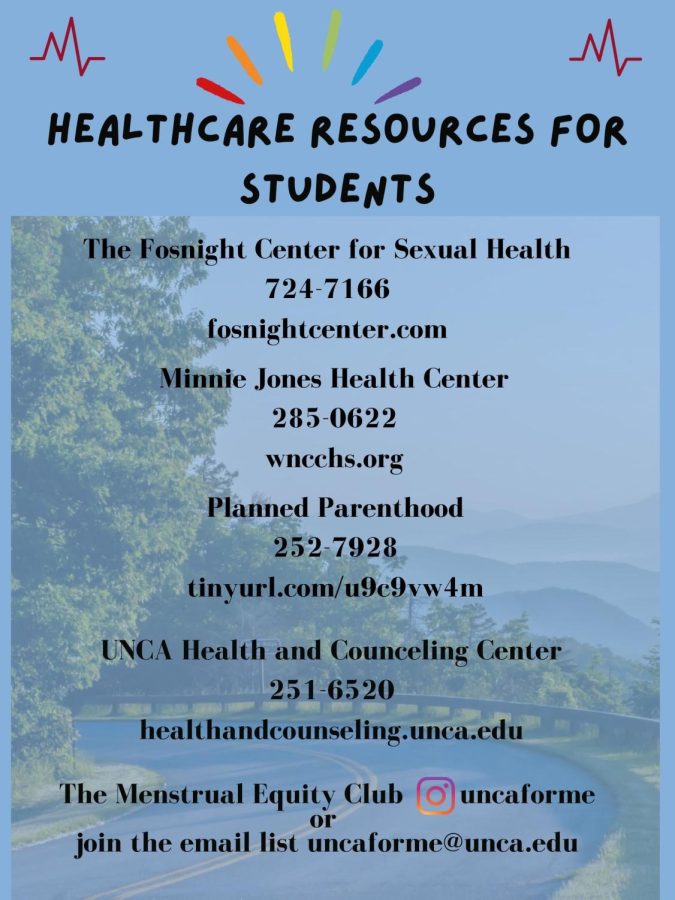UNCA and Asheville clinics priortize inclusive healthcare
A list of local resources offering inclusive health care.
September 4, 2022
For young students, seeking reproductive health resources available in the area may be difficult to find.
“Fosnight Center embraces the uniqueness of each individual in an effort to ensure all feel safe and welcome regardless of intersectional identities,” said Casey Duncan, the director of administrative services for the Fosnight Center for sexual health in Asheville.
The director said the Fosnight Center provides inclusive healthcare for all bodies. The center covers gender affirming care, gynecology and urology services, sexual and integrative medicine and physical therapy.
“At the Fosnight Center, we recognize the pieces and put them together to create an individualized treatment plan through a multidisciplinary team approach,” Duncan said. “You will have the opportunity to be evaluated by our medical providers, pelvic health physical therapist and sex therapist in order to look at the whole picture of your health concern.”
The director said the sexual health center provides gender inclusive contraceptive care, gender affirming hormone therapies, STI testing and preventative care.
According to the CDC, before the overturning of Roe 65.3% of people born with a uterus were using contraceptives.
“We pride ourselves on creating a safe space for all our patients and clients.” Duncan said. “We believe everyone deserves to love their body.”
The Fosnight director said the center is passionate about reproductive freedom and bodily autonomy for all.
“We are committed to cultivating an inclusive environment that benefits all our providers, staff, clients, patients and the community,” Duncan said.
Duncan said the sexual health center accepts most commerical insurances and has self-pay discounts.
According to Planned Parenthood, after the overturn of Roe v. Wade on June 24, many Planned Parenthood centers were forced to close leavingmany low income young adults struggling to find affordable testing and sexual health clinics.
“The staff understand the unique needs and challenges of being a college student,” said Jay Cutspec, the director of Health and Counseling at UNC Asheville.
Cutspec said students receive basic reproductive care and services at UNCA comparable to a family physician’s office.
“We adapt our services to meet the unique needs of college students,” Cutspec said. “We have a diverse staff from a variety of backgrounds and experiences.”
The health and counseling director said they advise students to make the Health and Counseling Center their first step. If they cannot provide specific services or have unmet needs, students will be referred to the most appropriate community provider.
The phone number for the Health and Counseling Center is (828)-251-6520.
“We also understand that for many students, this may be the first time that they have to manage their own healthcare,” Cutspec said. “We try to educate them on how to manage the healthcare system.”
Cutspec said the only charge for a visit to the Health and Counseling Center is for possible medication prescription or lab tests received during the visit.
The Menstrual Equity Club on UNCA’s campus takes these matters into their own hands providing safer sex supplies, menstrual products and community health resources.
“We have had the pleasure of partnering with organizations such as the Western North Carolina Aids Project and Planned Parenthood,” said Samantha Mazze, a UNCA student studying psychology and co-president of the equity club.
“Through these collaborations we have been able to provide the campus population with free HIV testing and guest speaker community health educators,” Mazze said.
Mazze said the club members pride themselves on providing safe spaces for students to discuss reproductive justice, campus community needs and concerns.
The UNCA student said this was their third year being a part of the Menstrual Equity club.
The co-president said in the past year one of the biggest projects the club worked on was providing free menstrual products in all bathrooms on campus.
“One of our goals for this next year is to make sure all students on campus have access to these essential supplies regardless of the bathroom they use,” said Mazze.
Mazze said another project the club organizes is the packing party, a Halloween goodie bag filled with menstrual products, candies, stickers and more for students. The co-president said with events like packing parties the club donates supplies back to the community.
The UNCA student said the presence of organizations like the menstrual equity club are crucial because voices are not being heard.
“We continue to see people of color and the LGBTQ+ community be consistently overlooked by our healthcare and justice systems,” said Mazze.
Mazze said after their graduation they want to continue their efforts in reproductive health, and become a sex therapist.
The co-president said students wishing to get involved can follow the club’s instagram page @uncaforme or join the email list [email protected].


![Brooke Pedersen [second from the right] and Luis Reyes [right] hold banners during the Wrap The Woods event.](https://thebluebanner.net/wp-content/uploads/2025/09/ELIZABETH_PRITCHITT_IMG_3470-1200x804.jpg)
















